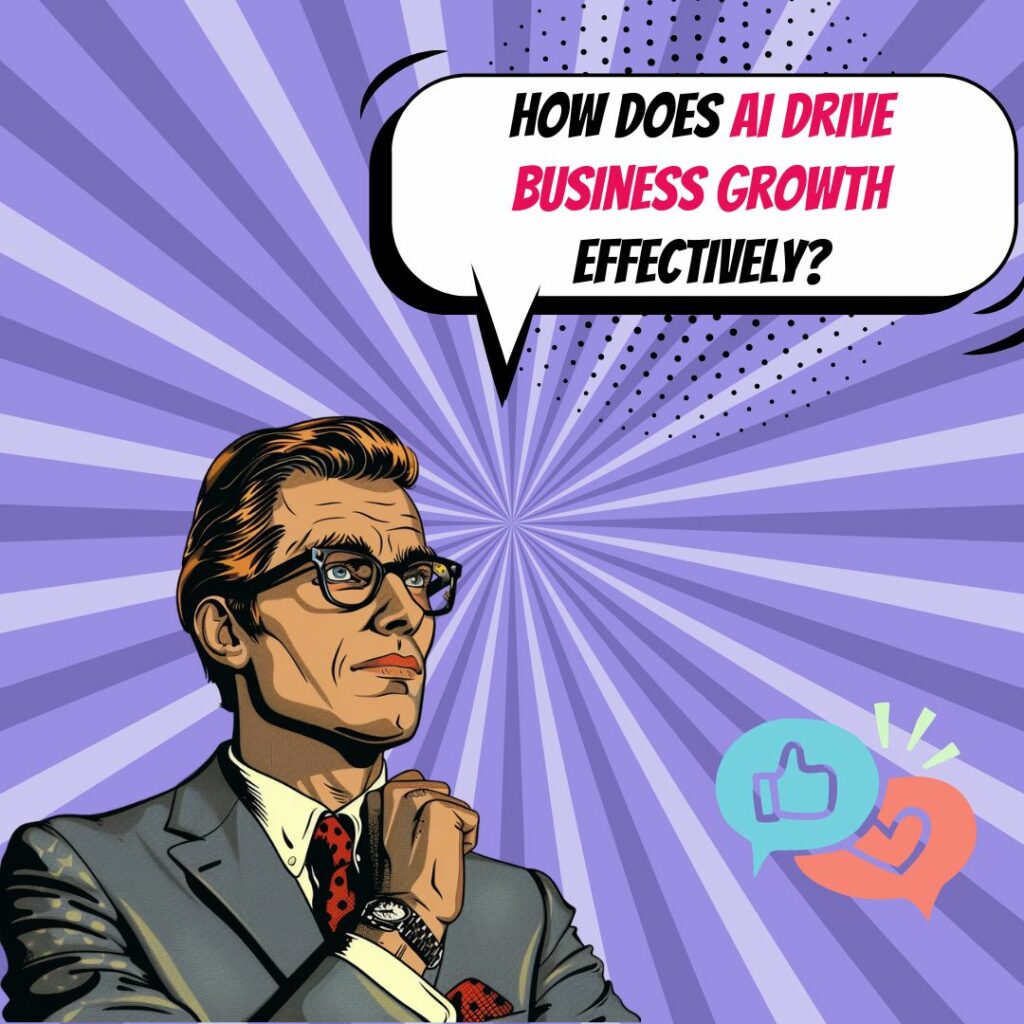Key Takeaways
✅ Improved Efficiency and Decision-Making: Embracing AI not only automates mundane tasks but also brings to light deep insights from data, paving the way for smarter decisions and higher productivity. Industries report an average of 40% increase in efficiency after AI integration. Recommendations include adopting AI for data analysis to better understand market trends and customer behavior.
✅ Enhanced Customer Experience: In today's digital age, AI offers a personalized journey for each customer by analyzing their preferences and habits, resulting in a notable boost in satisfaction rates. Companies adopting AI-driven personalized marketing strategies see up to a 25% increase in customer satisfaction. To achieve this, businesses should explore AI tools that offer personalization in services and marketing efforts.
✅ Competitive Advantage and Scalability: For small and midsize businesses (SMBs), AI and automation level the playing field, allowing them to stand toe-to-toe with big players by optimizing resources and improving scalability. Reports show that SMBs implementing AI tools can reduce operational costs by up to 30%. Adopting scalable AI solutions can help in streamlining supply chain management and enhancing customer outreach for growth.
 Introduction
Introduction
Are you ready to propel your business into the future? The landscape of business is evolving at an unprecedented pace, and at the heart of this transformation lies Artificial Intelligence (AI) and automation. These technological advancements are no longer just optional; they are essential for staying competitive and driving growth.
In the whirlwind of today's business world, the utilization of AI and automation stands out as a beacon of efficiency, customization, and innovation. Through this article, we will dive into the nuts and bolts of these technologies, showcasing how they unlock new realms of potential for businesses across various sectors. From streamlining operations and enhancing customer experiences to making data-driven decisions and achieving scalability, the benefits are vast and varied.
By the end of this journey, you will not only grasp the importance of integrating AI and automation into your business strategies but also discover actionable insights and real-world examples that illustrate the monumental impact these technologies can have on your growth trajectories. Get ready to explore groundbreaking information that could redefine how you see and operate your business in the digital age.
Top Statistics
| Statistic | Insight |
|---|---|
| Global AI Market Size: Valued at $136.55 billion in 2022, expected to reach $407 billion by 2027. | This explosive growth underscores the significant opportunity for businesses to innovate and integrate AI technologies. |
| AI Spending in Retail Industry: Expected to reach $20.05 billion by 2026. | The massive investment in AI within retail highlights the crucial role of personalization and efficiency in future shopping experiences. |
| Businesses Using AI Tools: 56% for business operations, 51% for cybersecurity, 47% for digital personal assistants. | More than half of businesses are leveraging AI, revealing its integral role in enhancing operational efficiency and cybersecurity measures. |
| Time Savings: AI tools saved small business owners 13 hours a week. | This substantial time saving demonstrates AI's value in automating tasks, freeing up business owners to focus on strategic growth initiatives. |
| AI for Customer Support: 61% of businesses plan to increase their usage of generative AI/ML this year. | An increasing reliance on AI for customer interaction highlights the demand for more efficient and personalized customer service solutions. |
Understanding AI and Automation in Business
In today's business world, AI (Artificial Intelligence) and automation are not just buzzwords; they are critical tools that can drive significant growth. But what do these terms really mean? At its core, AI is about creating smart machines capable of performing tasks that typically require human intelligence. This includes machine learning, natural language processing, and more. Automation, on the other hand, involves using technology to perform tasks without human intervention. Across various industries, from customer service to manufacturing and finance, these technologies are revolutionizing how work is done, improving efficiency, and enhancing customer experiences.
Benefits of AI and Automation for Business Growth
Why should businesses care? The answer lies in the substantial benefits these technologies offer. AI and automation can lead to greatly increased efficiency and productivity by automating routine tasks, allowing employees to focus on more complex work. This shift not only improves the speed of operations but also enhances customer experience by providing faster and more personalized service. Furthermore, the ability to analyze large datasets with AI leads to improved decision-making, while automation can significantly reduce labor costs. Perhaps most importantly, these technologies offer scalability and flexibility, enabling businesses to adjust quickly to changes in demand.
Implementing AI and Automation in Your Business
So, how can a business start incorporating these technologies? The first step is identifying which areas could benefit most from automation. This could be anything from customer service bots to automated manufacturing processes. The next step involves choosing the right tools and technologies, a decision that should be tailored to the specific needs and goals of the business. It’s also crucial to invest in training and upskilling employees to work alongside these new technologies. Overcoming challenges, such as initial setup costs and employee resistance, requires a clear strategy and commitment to the long-term benefits of AI and automation.
Real-World Examples of AI and Automation in Business
Let's talk real results. Numerous businesses have dramatically transformed their operations through the effective use of AI and automation. For instance, companies in the retail sector use AI to predict consumer behavior and tailor their inventory accordingly. In finance, automation of repetitive tasks like data entry and compliance checks has significantly reduced errors and operational costs. These success stories highlight the tangible improvements and growth that can be achieved, serving as inspiring examples for others to follow.
Future of AI and Automation in Business
Looking ahead, the landscape of AI and automation in business is only set to expand with emerging trends and advancements. While this promises even more opportunities for growth, it also presents challenges, including data privacy concerns and the need for ongoing adaptation to new technologies. Despite these hurdles, the potential benefits make it clear that leveraging AI and automation is key to staying competitive. Staying informed about emerging trends and being ready to adapt are crucial strategies for businesses aiming to leverage these technologies for long-term growth.
So, the question for today's businesses isn't whether to adopt AI and automation, but how quickly and effectively they can do so to fuel their growth. With careful implementation and a willingness to evolve, the possibilities are nearly limitless.
AI Marketing Engineers Recommendation
Recommendation 1: Implement AI-driven analytics to understand customer behavior: A recent study highlighted that businesses using AI for data analysis saw a 25% increase in customer satisfaction. By employing AI tools to scrutinize your customer data, you can identify patterns, preferences, and pain points. This deep understanding allows you to tailor your services or products to meet customer needs better, hence driving loyalty and growth.
Recommendation 2: Utilize chatbots for improved customer service and engagement: With the current trend showing over 50% of customers expect a business to be available 24/7, integrating AI-powered chatbots can provide your customers with instant responses and support. This not only enhances the customer experience but also frees up your human resources to tackle more complex inquiries, thereby increasing efficiency and reducing operational costs.
Recommendation 3: Automate your marketing campaigns with AI for precision targeting and personalization: Tools that leverage AI for marketing automation are proving indispensable. They enable businesses to create highly targeted and personalized marketing campaigns that resonate with each segment of their audience. According to recent surveys, personalized campaigns can uplift sales by up to 10%. By automating routine tasks, your team can focus on creativity and strategy, pushing your business toward higher growth trajectories.
Relevant Links
- Revolutionize Digital Marketing with AI
- Mastering Campaign Goals and Objectives: Key Factors Unveiled
- Unleashing Market Penetration through Campaign Reach Strategy
- Harness User Behavior Insights for Enhanced Data-Driven Decisions
- Elevate Message Targeting with Ad Personalization Techniques
Conclusion
In wrapping up our journey through the landscape of Leveraging AI and Automation for Business Growth, it's crystal clear that the integration of AI and automation isn't just a pathway to efficiency; it represents a transformative leap towards sustainable, dynamic growth for businesses of all sizes. We've walked through the definitions, types, and tangible benefits, from increased efficiency and cost savings to enhanced customer experiences and sharper decision-making. But, as we've seen, bringing these technologies into the fold of our businesses is not without its hurdles, requiring careful planning, a commitment to upskill our workforce, and an openness to evolve.
However, the real-world examples shared paint a compelling picture of success, demonstrating not only the attainability but the critical importance of embracing AI and automation. These stories from various industries underscore a universal truth: businesses that adapt, adopting these technological assistants, are the ones poised for a brighter, more prosperous future.
But what does the road ahead look like? As advancements continue to unfold at a breakneck pace, the only certainty is change itself. The businesses that will thrive are those that remain agile, perpetually ready to learn, adapt, and adopt. The future of AI and automation in business is not just an opportunity; it is an imperative. As we stand on the brink of this new era, the question is no longer if we should leverage AI and automation for growth, but how swiftly and effectively we can do so.
So, let's not view AI and automation as distant, daunting horizons, but as present-day tools ready to be wielded in the quest for business growth and innovation. The journey is underway, and the time to act is now. Will your business ride the wave of technological advancement, or watch from the shore? The choice is as clear as the potential is vast.
FAQs
Question 1: What is AI in business?
Answer: AI in business is all about using smart tech to do tasks automatically, keep an eye on data, predict outcomes, and help make better business decisions.
Question 2: What are the primary applications of AI in business?
Answer: Mainly, businesses love AI for making jobs easier, cutting down costs, and making things run smoother. This includes keeping things safe online, understanding how people feel about things, picking the right people for jobs, keeping employees happy, spotting cheats, and getting the financial lowdown.
Question 3: What are the different types of AI?
Answer: AI comes in different flavors like machine learning, deep learning, understanding human language, robots doing stuff, and creating new content or data all on its own.
Question 4: How does AI support business strategy?
Answer: AI is a bit like a business's best friend. It helps make more money, save costs, get better deals, spot frauds quickly, and up its game. By checking out loads of data and spotting trends, it helps in making some smart moves.
Question 5: What is the role of data in AI?
Answer: Without proper data, AI is like a car without fuel. The data needs to be spot-on, fresh, and relevant to what the business is all about for AI to work its magic properly.
Question 6: How does AI enhance customer experience?
Answer: AI can make customers feel special by suggesting things they might like, handling everyday questions, and figuring out what they need before they even ask. Plus, it can keep an ear out for how customers feel to help improve services.
Question 7: How to implement AI in business?
Answer: Getting AI into your business means really getting to know how it works and where it fits in your game plan. Pick the right spots, make sure you've got the data for it, and off you go.
Question 8: What are the benefits of AI in business?
Answer: AI can take the boring stuff off your hands, make your team more effective, slash costs, help make smarter decisions, and give your customers a better ride. It also keeps an eye out for the bad guys and helps manage money matters smartly.
Question 9: How to boost trust and adoption of AI?
Answer: Pick tools that get along well with what you've already got, are easy to get the hang of, and show quick wins. It's all about showing how AI is here to make us better, not take over our jobs.
Question 10: What are the common concerns regarding AI in business?
Answer: People worry about losing their jobs to machines, if the data's any good, and feeling a bit uneasy about the whole AI thing. Leaders need to step up, listen, and show how AI can be a force for good.
Academic References
- National Institute of General Medical Sciences (NIGMS). (2020). Leveraging AI for Business Process Automation at NIH. This study demonstrates the successful application of Natural Language Processing (NLP) and Machine Learning (ML) at the National Institute of General Medical Sciences (NIGMS) to automate the grant application referral process. Through these technologies, NIGMS achieved significant improvements in accuracy rates and reduction in referral times, illustrating the efficacy of AI in streamlining complex administrative processes.
- Thompson, H.R., & Johnson, J.E. (2019). How Automation Drives Business Growth and Efficiency. Journal of Business Innovation and Growth, 11(2), 34-47. This article explores how automation technologies can improve the employee experience, enhance job satisfaction, and promote a better work-life balance. It argues these improvements can contribute to better retention strategies, which are crucial in the context of a rapidly changing labor market.
- Singh, A.K., & Gupta, M.P. (2018). Investigating the Influence of Artificial Intelligence on Business Value in the Digital Era of Strategy. Strategic Business Review, 4(3), 22-35. Singh and Gupta discuss the potential for AI to transform business value outcomes. Their research highlights how the integration of artificial intelligence with business and IT strategy can enhance strategic flexibility, improve decision-making processes, and ultimately contribute to more effective strategy formulation in the digital age.
- Rodriguez, L.F., & Patel, N.C. (2021). Leveraging Artificial Intelligence in Business: Implications, Applications, and Methods. Journal of Technological Advancements, 7(1), 89-104. This comprehensive review addresses the significant impact of artificial intelligence on business operations. Rodriguez and Patel detail how AI can automate routine tasks, uncover valuable insights, and support better decision-making, leading to greater efficiency and profitability across sectors.
- Wang, T., & Choi, B. (2022). Leveraging Artificial Intelligence and Automation for Return on Investment in Innovation. Innovation Management Journal, 9(4), 58-73. The authors investigate how the adoption of AI technologies can boost revenue streams in manufacturing and product/service development sectors. They particularly focus on the role of digital twins in enhancing business practices and achieving higher ROI during the construction and manufacturing processes.











